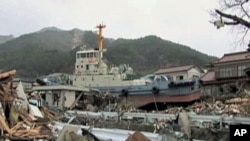The massive tsunami that struck Japan in March tore through the remote fishing towns on the northern Pacific coast, destroying virtually everything in its path. Doubts remain over whether the communities will be able to rebuild along this rocky shoreline. Nearly five months on, though, there are signs of economic life amid the piles of wreckage.
An endless fleet of trucks and excavators rolls through what remains of Rikuzentakata. The town lies at the mouth of a coastal valley - the Pacific on one side, mountains the other. Its only defense, a concrete sea wall, which turned out to be woefully small.
The tsunami wiped Rikuzentakata off the map, killing more than 2,000 of its 23,000 residents and annihilating almost every building in sight.
There are occasional green shoots of life. Amid the twisted piles of wreckage, one enterprising shopkeeper is back in business from a makeshift hut. The electricity substation is being repaired. The incalculable tons of wreckage are being collected, crushed and recycled or disposed.
But it’s not clear exactly what - if anything - will take its place. Orikawa Yuukichi has watched the town he grew up in reduced to twisted metal and splintered wood.
“We are so busy trying to tidy up all this wreckage,” he said. “There are mountains and mountains of debris and garbage. All we’re doing these days is tidying up.”
Here in Japan’s northern Iwate prefecture, the tsunami was funneled up narrow coastal valleys, amplifying its destructive power. In some places the water reached nine-and-a-half kilometers inland.
Further up the coast in Ofunato, the port’s tugboat still sits in someone’s backyard about a kilometer from the water.
Back in March it appeared the industrial heart had been ripped put from towns like this and taken out to sea. But some residents are fighting back.
Thanks in part to help from overseas charities, Ofunato’s fish market has reopened. The first boatloads of silver salmon were auctioned in July.
Captain Abe is about to put out to sea from the port. His boat, the Hanasakimaru, was badly damaged by the tsunami.
He said, “The engine room got a hole in it, so he took it to Shikoku [further south]. It cost about $6,500 to fix.”
Now that the Hanasakimaru is again seaworthy, Abe and his crew are preparing for a month at sea.
“It’s so good to start fishing again. I’m a fisherman at heart, so it’s great to be on the boat again. But after I catch the fish, there is no place to unload along this coast,” he said. "There are no facilities like ice stores, so we unload the fish in Hokkaido [further north].”
It will take many years for these remote communities to rebuild. Fishermen like Captain Abe believe their town’s only economic hope lies in once more embracing the ocean that brought it so much destruction.




